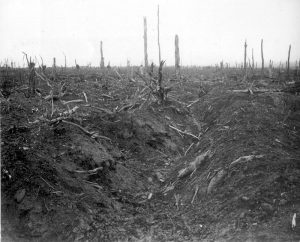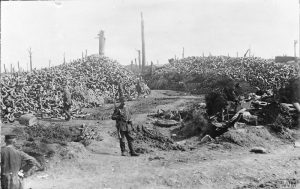Those who have experienced war often write about its monotony. The majority of Peirs’s letters home depict the day-to-day domestic life of an officer in war. Food, tobacco, creature comforts, and most of all, news from home – these things made up quite a bit of his writing to his family. When Peirs did write about action, he was often brief and reassuring to his parents.
To us his tone is sometimes frustratingly plucky, something that we (our team) have a hard time understanding. Though we have all worked to increase our understanding of the society and culture in which Peirs came from, we can only get so close without our own sensibilities interfering. Jack’s writing about the battle of Delville Wood is a case in point: the man was in a lot of danger and wrote home very little about it.
First, some context. The 8th Queen’s had a rough introduction to month of September 1916. The Somme battle (or series of battles) was entering its third month. The British and French armies had fought a number of major engagements including a series of attacks at a small forest near Ginchy named Delville Wood. British and South African forces assaulted the wood in July and it was contested ground for seven weeks. The wood, itself, by August was completely flattened: Both British and German artillery felled the trees and the area was a mess of shellholes, muddy trenches, and tree trunks.
The 8th Queen’s arrived at Delville Wood on 30 August 1916. They had a warm greeting as they entered their reserve trenches; the enemy bombarded them with gas shells inflicting 18 casualties. On 1 September, the battalion went into the wood to relieve the 8th Royal West Kent Regiment, who had suffered heavily. Just going up the line for 8th Queen’s proved arduous and costly – the battalion suffered a further 16 casualties just moving up to their trenches – and over the next four days they faced heavy bombardment and repeated German attacks. When the battalion left Delville Wood the night of the 5th, they had suffered 143 casualties in four days of holding their trenches.
Peirs wrote his family nothing of the military situation of the battalion. Yet he did relay some interesting details of his predicament. On the 31st, Peirs indicated that there was heavy rain and that the men occupied muddy trenches. He wrote:
The weather the last two days has been too filthy for words & the trenches must be indescribable. I have seen some men who have been in them the last few days & I never saw such disgusting looking objects.
On September 2nd, he was in a dug-out somewhere on the edge of the wood. The wood was under heavy bombardment and there had been German attacks upon British positions. Here is what he wrote to his mother of his predicament:
As you say you know I am in the big push I can’t contradict you and am at the moment sitting in a deep Bosch dug-out which was built for a worthy Hun & is now used by the unworthy British. And it is a great safeguard as of course he knows of the place & constantly strafes it & last night blew in the entrance only owing to the Bosch’s foresight he had cut a passage into another dug out & we could get aid through that if we had needed it, though we dug ourselves out with no difficulty.
Peirs tells us a bit more here about his situation and we know that he is occupying a former German command post. Peirs surmised that the reason they were being shelled so heavily was because the Germans knew the dug-out’s location. It was a dangerous place to be and a shell blew up (or in) the entrance to the dug-out forcing Peirs and his companions to dig themselves out.
Peirs often made light of danger to his family. With only rare exception was he wont to discuss bloodshed or losses. One can assume that he was very conscious of his family’s feelings and that he was relatively careful in what he was writing home (and not necessarily because of official censorship).
He wrote two letters home after the battalion came out of Delville Wood. The first is incomplete and a rather filthy letter, with stains and blotchy ink all over it. In it he mentions Prime Minister Herbert Asquith’s visit to the front, sarcastically writing
The Rt. Hon. Erbert Enery Asquith was mucking about this morning & has by this time probably blown himself up with a bomb or been blown up by a shell – this is no place for globe trotters
He also responded to a note from his family about men singing in the line
I have never heard anyone sing anything there, though someone did come across a fellow playing a mouth organ to himself in a shell hole where he had been for some hours waiting for help as he couldn’t get out himself.
If the wounded man described was in the 8th Queen’s, there is a chance that mouth organ was bought by Jack’s father, Hugh Vaughan Peirs, and distributed by Jack his first month in France, September 1915. This is a sobering thought, in particular, if Hugh Vaughan Peirs made the same connection when he read the letter.
By 8 September, Jack was back to something of his old self after the fighting at Delville Wood writing home to his mother about living it up in the French countryside.
This is quite a pleasant village & very refreshing after the district we have left & I can see some fat ducks in the yard & there are butter & eggs & milk about which we have not had except tinned for some time, so I fancy we shall do ourselves pretty well.
No doubt, they did.



